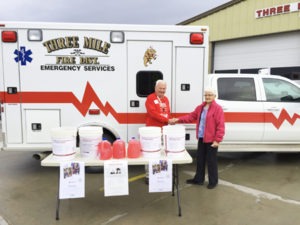
By Michael Howell
Ted Burnham, who lives in the Lone Rock area, is a generally happy and healthy guy who likes to help others. He found a way to help people in life threatening situations, without even knowing who they are, and he has been at it steadily for years now. He began making regular donations of his blood to the Red Cross and to date has given over 23 and a half gallons.
Burnham is very modest about his charity.
“You can ask anybody at the Red Cross and they’ll tell you, twenty-three and a half gallons is no record,” said Burnham. “But it is something that somebody in generally good shape and good health can do and it can really save lives.”
It was also consideration for others that led Burnham to make an appointment in Missoula to make a donation at 7 a.m. on Easter morning. That’s because he is not donating whole blood, he is donating blood platelets, just one component, along with red cells, white cells and plasma, that makes up a person’s blood.
Although similar to donating blood, platelet donation uses an automated machine. A relatively small amount of blood is drawn from a donor’s arm and goes into a blood cell separator. This blood is rapidly spun, which forces the platelet cells to the bottom. These cells then go into a sterile, single-use plastic bag. Meanwhile, the rest of the blood – the plasma, red cells and white cells – is returned to the donor. The whole process takes about three hours, compared to a normal donation of whole blood which only takes a few minutes. While the Red Cross travels across the state taking blood donations, platelets can only be taken in Missoula or Great Falls.
Platelets are cells in the blood that help form clots and control bleeding and are used routinely in hospitals to support patient surgeries, cancer patients, blood disorders and organ transplants. Once bagged, though, the platelets have a life span of only five days and must be used within that time frame. That’s why a constant stream of platelets is required and the day a person chooses to donate is an important consideration. Burnham figured he would fill in on a day that many people might choose not to donate, like first thing Easter morning.
Burnham doesn’t think that what he’s doing is anything that special and was a bit shy about accepting any public recognition or big to-do about it. But when an old friend of his explained that a little publicity could lead to a few new regular donors showing up who just hadn’t given it a thought, it changed his mind. He’s all in favor of drumming up some more donors. After all, his own 23 and a half gallons is really just a drop in the bucket when you look at what’s actually needed, continually.
The need is greater at different times at different hospitals due to schedules and the time it takes to prepare platelets for transfusion. Prospective donors should contact the Red Cross staff about priority donation days. You can go online at www.redcrossblood.org or call 1-800-733-2767.